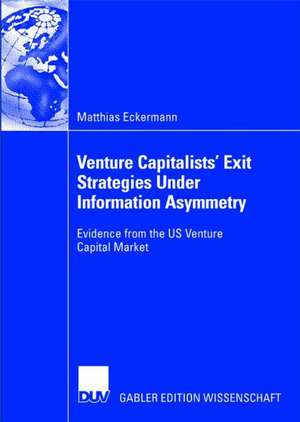Venture Capitalists' Exit Strategies under Information Asymmetry: Evidence from the US Venture Capital Market
Autor Matthias Eckermannen Limba Engleză Paperback – 26 ian 2006
Preț: 387.75 lei
Nou
Puncte Express: 582
Preț estimativ în valută:
74.20€ • 76.55$ • 61.92£
74.20€ • 76.55$ • 61.92£
Carte tipărită la comandă
Livrare economică 27 martie-10 aprilie
Preluare comenzi: 021 569.72.76
Specificații
ISBN-13: 9783835001268
ISBN-10: 3835001264
Pagini: 304
Ilustrații: XVII, 287 p. 38 illus.
Dimensiuni: 148 x 210 x 17 mm
Greutate: 0.41 kg
Ediția:2006
Editura: Deutscher Universitätsverlag
Colecția Deutscher Universitätsverlag
Locul publicării:Wiesbaden, Germany
ISBN-10: 3835001264
Pagini: 304
Ilustrații: XVII, 287 p. 38 illus.
Dimensiuni: 148 x 210 x 17 mm
Greutate: 0.41 kg
Ediția:2006
Editura: Deutscher Universitätsverlag
Colecția Deutscher Universitätsverlag
Locul publicării:Wiesbaden, Germany
Public țintă
ResearchCuprins
Venture Capital Investing.- Exiting Ventures.- Building an Analytical Framework.- Research Methodology.- Empirical Analysis.- Conclusion and Implications.
Notă biografică
Dr. Matthias Eckermann promovierte bei Prof. Dr. Michael Schefczyk am Lehrstuhl für Entrepreneurship und Innovation an der Technischen Universität Dresden. Er ist im Investment Banking in London tätig.
Textul de pe ultima copertă
Venture capitalists (VCs) fund ventures with the aim of reaping a capital gain upon exit. Research has identified information asymmetry between inside investors and follow-on investors as a major source of friction. It is thus in the interest of VCs to reduce information asymmetry at exit.
Matthias Eckermann analyzes how VCs integrate information efficiency considerations into their exit strategies. He shows that VCs adopt specific strategies to cope with information gaps upon exit in terms of timing, exit vehicles and promotion efforts. On this basis he develops a framework to help VCs to improve profitability through decisive exit strategies.
Matthias Eckermann analyzes how VCs integrate information efficiency considerations into their exit strategies. He shows that VCs adopt specific strategies to cope with information gaps upon exit in terms of timing, exit vehicles and promotion efforts. On this basis he develops a framework to help VCs to improve profitability through decisive exit strategies.


















